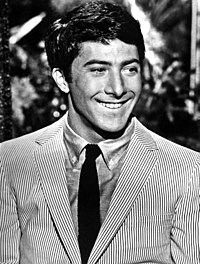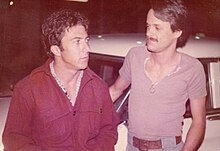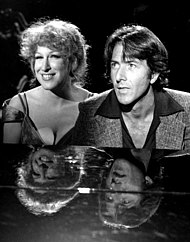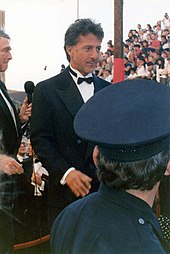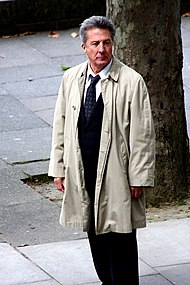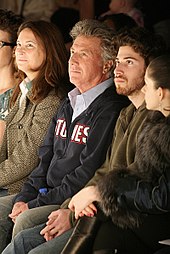Dustin Hoffman
He subsequently starred as Willy Loman in the 1984 revival of Death of a Salesman and reprised the role a year later in a television film, earning a Primetime Emmy Award for Outstanding Actor in a Limited Series or Movie.
[31] In 1962, he appeared in Rabbit Run Theatre's summer stock production of Write Me a Murder in Madison, Ohio[32] and served as an assistant director to Ulu Grosbard on The Days and Nights of Beebee Fenstermaker at off-Broadway's Sheridan Square Playhouse.
[39] Hoffman's "sharply outlined and vividly colored" performance in off-Broadway's The Journey of the Fifth Horse[40] in April 1966 was followed by another critical success in the play Eh?, by Henry Livings, which had its U.S. premiere at the Circle in the Square Theatre on October 16, 1966.
[citation needed] Director Mike Nichols auditioned Hoffman in 1966 for a lead role in the Broadway musical The Apple Tree but rejected him because he could not sing well enough, and gave Alan Alda the part.
He credits Hoffman with breaking "the mold of the traditional movie star and brought to their roles a new candor, ethnicity, and eagerness to dive deep into complex, even unlikable characters.
"[44] Nixon expands on the significance of the film to Hoffman's career: "In The Graduate, he created a lasting resonance as Ben Braddock that made him an overnight sensation and set him on the road to becoming one of our biggest stars and most respected actors.
After spending that money, Hoffman filed for New York State unemployment benefits, receiving $55 per week while living in a two-room apartment in the West Village of Manhattan.
'"[46] Critics assumed that director Mike Nichols got lucky by finding a typical actor with average acting ability to play the part of Benjamin Braddock.
"[57] Movie critic Judith Crist gave Hoffman credit for the ultimate success of the film: What is important is that Bruce's routines are so artfully reconstructed, the juice of his creativity so carefully strained, that the claim to genius is justified.
[59] All the President's Men (1976) was made less than two years after the Watergate scandal, and starred Hoffman and Robert Redford as the real-life journalists, Carl Bernstein and Bob Woodward, respectively.
Based on actual events, Hoffman and Redford play Washington Post reporters who uncover a break-in at the Watergate Hotel and end up investigating a political scandal that reaches all the way to the presidency.
Described as "Schlesinger's thriller", by author Gene D. Phillips, Hoffman plays the hero, Babe Levy, a part-time long-distance runner and graduate student, who suddenly finds himself being pursued by a fugitive Nazi.
The film required Hoffman to change his attitude, from being a "desensitized advertising art director" into becoming a "responsive and concerned daddy" after his wife (Streep) walks out on him and their six-year-old son, Billy.
[70] Fellow actor Gary Oldman reported that, during a telephone conversation with Hoffman, the latter recalled having made comments toward a "very powerful" industry figure who ensured that he was unable to find work in Hollywood for some time following Tootsie.
"[25] Author Marie Brenner notes that Hoffman "has been obsessed with the play" throughout his career: "For years he has wanted to be Willy Loman; when he discovered that Arthur Miller was his neighbor in Connecticut, they began to talk about it in earnest.
"[57] He used that experience to help him develop the character of Raymond Babbitt, a high-functioning autistic savant, yet a person who critic David Denby described as "a strangely shuttered genius".
The story centers on the estrangement between Vito (Hoffman), a middle-aged man trying to succeed in a legitimate business, and his "hopelessly corrupt but charming father", Jesse (Connery).
Hoffman played the lead role in Outbreak (1995), alongside Rene Russo, Kevin Spacey, Morgan Freeman, Cuba Gooding Jr. and Donald Sutherland.
[86] The movie is described by critic Roger Ebert as "one of the great scare stories of our time, the notion that deep in the uncharted rain forests, deadly diseases are lurking, and if they ever escape their jungle homes and enter the human bloodstream, there will be a new plague the likes of which we have never seen.
The story takes place a few days before a presidential election, where a Washington, D.C. spin doctor (De Niro) distracts the electorate from a sex scandal by hiring a Hollywood film producer (Hoffman) to construct a fake war with Albania.
Hoffman, as a caricature of real life producer Robert Evans, according to some, "gives the kind of wonderfully funny performance that is liable to win prizes, especially since its mixture of affection and murderous parody is so precise.
Hoffman played theater owner Charles Frohman in the J. M. Barrie historical fantasia Finding Neverland (2004), costarring Johnny Depp and Kate Winslet.
In 2005, he voiced a horse in Racing Stripes, and appeared in cameo roles in Andy García's The Lost City and on the final episode of HBO sitcom Curb Your Enthusiasm's fifth season.
and in an episode of The Simpsons), Hoffman had a prominent role as Shifu in the film Kung Fu Panda, which was praised in part for his comedic chemistry with Jack Black (whom he tutored in acting for an important scene) and his character's poignantly complex relationship with the story's villain.
As the title character in Last Chance Harvey, Hoffman acted with co-star Emma Thompson in the story of two lonely people who tentatively forge a relationship over the course of three days.
In 2017, Hoffman starred in Noah Baumbach's Netflix film The Meyerowitz Stories alongside Adam Sandler, Ben Stiller, Elizabeth Marvel and Emma Thompson.
David Thomson of The Guardian described of Hoffman as a central figure of the late 60s, 70s and 80s" adding, "He is a part of what has turned out a very ambiguous vintage: it also includes Jack Nicholson, Robert Redford, Warren Beatty and Woody Allen, actors who cannot quite make up their minds whether they are adorable still or national treasures.
The director of the Independent Filmmaker Project (IFP) and Made in NY Media Center stated, "We are thrilled to present Dustin Hoffman with the Actor Tribute.
[128] In 1997 he was one of a number of Hollywood stars and executives to sign an open letter to the German chancellor Helmut Kohl protesting against the treatment of Scientologists in Germany, which was published as a newspaper advertisement in the International Herald Tribune.
[131][132][133][134] Anna Graham Hunter alleged that, while she was 17 and working as an intern on a TV production of Death of a Salesman, Hoffman made inappropriate jokes and comments around her and asked her to give him foot massages.
